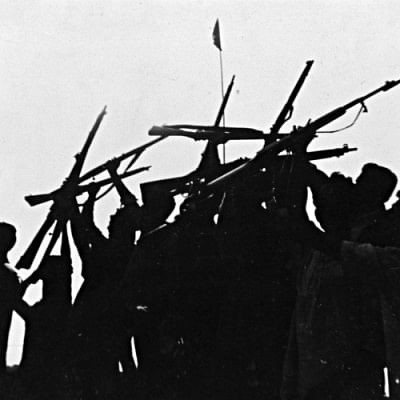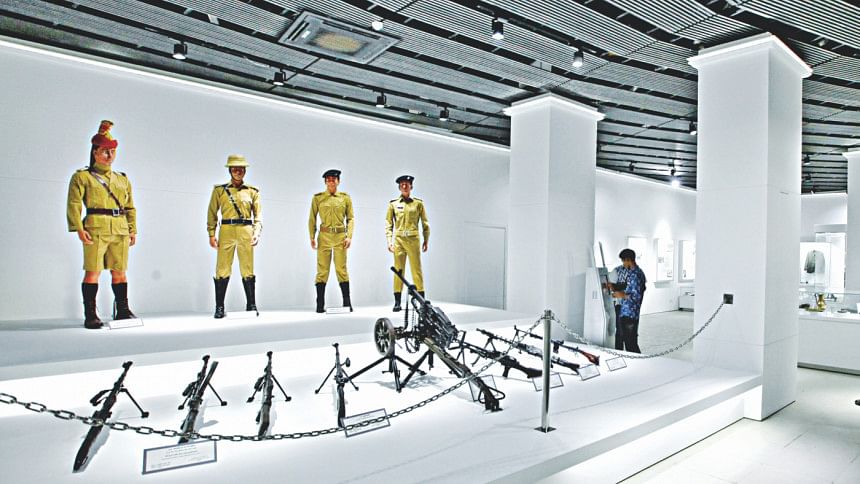Bangladesh Police in Liberation War

The Armed Bengali Policemen of erstwhile East Pakistan, especially of Dhaka city endeared themselves greatly to the freedom-craving Bengali masses in the wake of the historic non-co-operation movement that commenced at the call of Bangabandhu Sheikh Mujibur Rahman in March 1971. The occupation Pakistan Army never trusted Bengali policemen in their strategy to establish complete control over Dhaka city. Quite naturally, the Rajarbagh Police Lines became a headache to the Eastern command of the Pakistan Army.
On 4th March, 1971 several Policemen from Rajarbagh Police lines chanted full-throated slogans of “Joy Bangla” and thus expressed their solidarity with the mass upsurge. Thereafter, following the historic 7th March speech of Bangabandhu, the Policemen at Rajarbagh started preparing themselves in a cautious and guarded manner for open encounter in the not-too-distant future. They had to do so because there was a large number of non-Bengali junior officers serving in police lines at that time. However, that did not prevent the Bengali Policemen from bringing down the Pakistani flag before the armoury and replacing that by the Bangladesh flag.
On 16th March 1971 Bangabandhu Sheikh Mujibur Rahman came to the President House at Baily Road in a transport that carried the black flag on the bonnet. While the on-duty Pakistan Army Personnel did not pay any compliments to Bangabandhu, the armed Bengali Policemen posted there greeted him with full honours. On this day the Policemen of Dhaka City expressed their spontaneous support to various programs of the non-co-operation movement. Even the jeeps and trucks that were deployed for duties with the Pakistan President displayed black flags as token of sorrow and support.
The Pakistani establishment in March 1971 understood quite clearly that the Bengali policemen would be the main source of armed struggle of the Bengali people of East Pakistan. The now infamous “operation searchlight” has specifically directed for disarming Bengali Policemen of important districts.
Major General Rao Farman Ali recounts that the policemen at Rajarbagh revolted at 10 pm and opened fire on Pakistan Army trucks moving nearby. He adds that nearly 2000 policemen who put up stiff resistance were disarmed by 3 am. Many such policemen were killed and injured.
Activities and movements during the non-co-operation days of March 71 indicated that there could be an armed attack on Rajarbagh Police Lines by the Pakistan Army. Policemen deployed at different places in Dhaka city and intelligence personnel had similar premonitions. Therefore, the armed Bengali policemen at Rajarbagh remained mentally prepared to resist Pakistan Army attack. At midnight on 25th March, 1971 when Pakistan Army attacked the marginally armed policemen at Rajarbagh, a short but sharp resistance took place. The momentous event of being surrounded and attacked by Pakistan Army was transmitted to all districts and sub-divisions through police wireless.

There was no high-ranking officer available to command the rebellious policemen at Rajarbagh and thus they fought their own battle. They snatched the keys of the armoury from Reserve Inspector Mofizuddin and distributed 303 rifles and ammunitions amongst their comrades. The policemen took positions on different sides of Rajarbagh Police Lines, on surrounding rooftops and one particular group took position in present-day Bangla Motor Area.
When the convoy carrying the Pakistan Army personnel reached the main gate of Rajarbagh Police Lines they were subjected to continuous volleys of .303 rifle fire from different directions. This heavy attack surprised the Pakistan Army initially but not very long thereafter, they counter attacked with heavy machine gun being effectively supported by mortar and tank fire. Four barracks of reserve police caught fire as a result and policemen ran in different directions to escape from continuous barrage of bullets and raging fire. It did not take long for the Pakistan Army to enter Police lines parade ground with heavy tank support. Even then many policemen continued firing from the roof of four-storied barrack. The Pakistan Army then fired to illuminate the area and killed Bengali policemen at fixed targets. Those policemen who could hide managed to retreat in several directions. Many also ran short of ammunitions and were compelled to withdraw.
In the above inspiring and historic resistance by Bengali policemen many valiant sons of the soil embraced martyrdom and nearly 150 police personnel of different ranks were captured by the Pakistan Army. The attacking Pakistan Army who carried automatic and heavy weapons like HMG and tanks numbered nearly 800.
The armed resistance of Bengali policemen at Rajarbagh would remain a milestone in the annals of our historic liberation struggle. This was a story of poorly armed but extraordinarily determined men who being energised by the indomitable fire of patriotism engaged headlong an adversary far superior in combat gear. They fought gallantly and sacrificed their lives so that we may live in dignity and peace. Today it is time to once again remember them in solemn silence and deep gratitude.
Muhammad Nurul Huda is a former IGP.

 For all latest news, follow The Daily Star's Google News channel.
For all latest news, follow The Daily Star's Google News channel. 



Comments